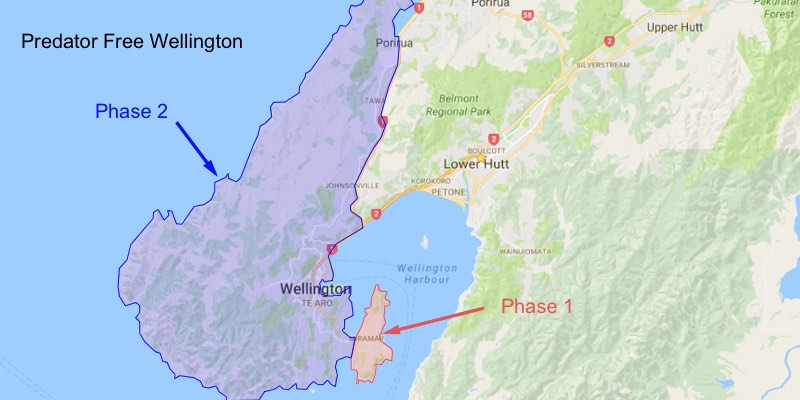Today the NEXT Foundation, Wellington City Council and Greater Wellington Regional Council announce a partnership with the ambitious aim of making Wellington the first predator free capital city in the world. If this can be achieved the city will truly be a safe haven where our native species can flourish.
How did this come about?
In 2013 the Morgan Foundation began the Enhancing the Halo programme, encouraging Wellingtonians to trap in their backyard and make their land a safe haven for the native species spilling out of Zealandia. There are now over a thousand traps scattered around the capital. Kiwibank is now working with Predator Free New Zealand to roll this model out nationwide.
In 2014 Crofton Downs took it to the next level, managing to make their suburb the first predator free community in the country (if not the world!) after winning a Morgan Foundation competition. They showed by getting a trap in every fifth backyard they were able to make their suburb predator free. Residents also reported a significant increase in the native birds in their backyards, and there are now at least 2 established kaka nests in the neighbourhood.
The man who led that project was Kelvin Hastie, a local resident of Crofton Downs. He is now engaged as NEXT Predator Free Community Champion in the wider vision for a Predator Free Capital.
What’s the Plan?
Phase one of the partnership will focus on the Miramar Peninsula. The Peninsula has been possum free since 2006, and as you can see on the map it is protected from reinvasion by the natural barrier of the airport. The plan is to see what it takes to remove rats and stoats from the Peninsula and protect it. The learnings from phase one will inform how the next stage rolls out.
All going well, phase two of course is to make Wellington truly a predator free capital. This is a much more difficult target than suppression of predators; it requires catching every last one. The challenge then becomes protecting the city from reinvasion, particularly around the port. Luckily, like Miramar, Wellington City has a wonderful natural barrier in the motorway which crosses from one coast in Porirua to another at Kaiwharawhara as can be seen on the map. This could provide a barrier to help prevent reinvasion after phase two is complete, although obviously Porirua City Council will have to be onside for that to happen.
Cats and Dogs off the table… for now
Of course rats, stoats and possums aren’t the only predators in our city; cats and dogs are an issue too. According to the partners in this announcement:
Management of cats and dogs is not included in the scope of the proposed project but the need for Wellington residents to be responsible pet owners is a matter of ongoing interest to the Councils.
Wellington has already made progress on this issue with dog bylaws and by putting in place compulsory microchipping for cats. But Wellington City Council has already stated that Central Government legislation will be needed for them to ensure that cats can be managed in the way dogs are. The need for a ‘Cat Act’ was underscored by the National Cat Management Strategy group last week.
Progress Towards the Predator Free Vision
This year has been a massive boost for the Predator Free vision. First we had the Million Dollar Mouse project back in May – eradicating mice on the Antipodes Island. This will make yet another subantarctic island a safe haven for our native species. Then we saw the Government get in behind the vision, announcing an ambitious target to make NZ Predator Free by 2050. They have invested $28m and are looking to leverage double that from local government, communities and philanthropists.
The technology to do this is a challenge, but answers are on the way through organisations like Zero Invasive Predators and local companies like Goodnature with their self-resetting traps.
The real challenge is going to be mobilising the public, getting everyone to do their bit in their backyards and nearby parks. Wellington already has 120 community groups working in the city, but we will need to engage even more people to make this vision a reality.

